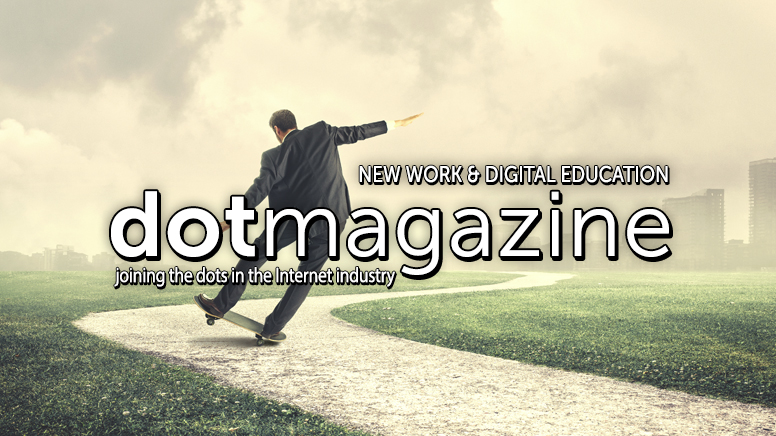Women in the Tech Industry
Stefanie Kemp, Member of the eco Association Presidency Committee, on role models, the gender quota, and the importance of diversity for successful teams.

© metamorworks | istockphoto.com
There are any number of good reasons as to why the Internet industry needs female reinforcement. Numerous fields in the branch are up against a shortage of skilled workers. What’s more, homogeneous teams and uniform ways of thinking represent a clear obstacle to innovation. The digital industry is booming, new digital business models are being created each and every day, and lucrative jobs are being created – but all too often, women are still missing out. The eco Association wants to change that. As part of its topic field “New Work”, eco invites inspiring female specialists and executives from the Internet industry to take the floor in a series of articles on “Women in the Tech Industry”. Here we deal with the really important topics: from development perspectives, through career tips and hopes for the future, to the challenges in a male-dominated working environment – and ultimately, to highlighting why working in the Internet industry is fun. This article with Stefanie Kemp, Head of Business Transformation, Innovation and Digital at Lowell Group and Member of the eco Association Presidency Committee was first published as part of this series on eco.de in the German language on 28 June 2019.
eco: What is stated on your business card?
STEPHANIE KEMP: Head of Business Transformation, Innovation and Digital.
eco: Sounds really interesting. If I had your job, what could I expect from my daily work with Lowell Group? And what do you find particularly exciting about your job?
KEMP: The most exciting aspect for me is digitalization. In our area, what we’re dealing with are interesting questions and topics, such as future business models. Ultimately, what we’re looking at is the degree to which we can contribute to a digital ecosystem.
It goes without saying that we want to innovate our businesses. These are exciting challenges and they generate no end of fun. To take one example: At the moment, we're planning a workshop with an entrepreneur who has been funded by the state of North-Rhine Westphalia in his development of a startup scene and platform. And his strong digital focus is keeping us constantly on our toes. His success concept derives from thinking in terms of disruptive structures. But my daily work doesn't solely involve working with innovation hubs; around 80 percent of my time is taken up with meetings.
eco: Do you yourself have any role models? If you had the chance to meet some female personality, either living or dead (ideally from the tech industry): Who would it be and why?
KEMP: I encounter many people in my daily work who I regard as role models. This can be down to very simple things. I think it's great when people sitting in a meeting really listen to the person giving a presentation and really want to get involved and ask questions and get to the bottom of the subject. This comes under the banner of respectful interaction. For me, this serves as role model behavior.
Just today I was talking about celebrity role models with my colleague André and we came up with Lady Di. Lady Di may have on the one hand celebrated herself, but on the other hand, she did a lot for disadvantaged people through her charity work. I also have a role model in the area of Women in Tech: Ada Lovelace. She was a pioneer in and around 1830/1840 and at that time there was no such thing as a gender quota. Purely on the strength of her knowledge, her passion, and her interest, she succeeded in advancing her career as a mathematician. Not that she just did this alone: there was also a man in her life who developed the Analytical Engine alongside her. Their performance and their work are visionary. In effect, Lovelace wrote the world's first computer program. The programming language ADA was named after Ada Lovelace.
eco: What are the “Do’s and Don’ts” for women in the Internet industry?
KEMP: Without question, a clear “Do” is to remain authentic, to pursue your ambitions and your passion. The “Don’t” is not to simply assimilate and act like a man. For me, there is nothing worse than when a woman isn’t “herself”, in order to try to fit better into the male domain.
eco: You also act as a mentor for the Women into Leadership initiative and are committed to the promotion of women. From your point of view, what are women already doing very well and, on the other hand, where is there a need to catch up?
Kemp: When I look at my role as a mentor and the cooperation with my mentees, I believe that women still need to work on their self-confidence. What men always do and what women are less inclined to do is to directly and clearly state: “That's what I want” or “That's what I don't want.” This doesn’t just apply to work, it also applies to private life.
eco: We’ll now give you another interesting job and make you editor-in-chief of a leading media publication – let's say, the German BILD paper, or the German Zeit or FAZ newspapers: Which headline would you like to see in a lead article concerning “Diversity/Women in the Tech Industry”? And what should the article say?
KEMP: The question I’d blazon across the front page of the BILD would be: Where has the gender quota for women brought us? Followed up by: Are 30 percent of women already on supervisory boards? Does a woman want to be a gender quota girl? And what do men think of the quota? This subject area is still provoking extremely contentious debates.
eco: What do you yourself think of the gender quota for women?
KEMP: Personally, I thought it was good that this discussion was kicked off at one point. But I don't want to be a gender quota girl. For me, I want to be evaluated according to my performance and my everyday work. In addition, I don't want to get a job just because diversity or the quota is kicking in for the post in question. I mean, no woman on this earth wants to be a gender quota woman. I was recently in Vietnam due to work with an offshore partner. 50 employees were working for us there and I was so happy that 30 percent of them were women. I immediately posted a picture with these young ambitious STEM ladies who are real coders, programming. They’re not just sitting around: they’re managing projects or are Scrum Masters. In these countries it is far easier to ask: Why shouldn’t a woman do the same work as a man?
eco: Keyword – Diversity. What do you think the ideal team should look like?
KEMP: From my point of view, the ideal team is where everyone knows their strengths and weaknesses and where these are fully balanced within the team. I build my teams based on addressing my weaknesses and including colleagues who challenge me.
I know what I'm good at and I know what I'm not good at. For example, I'm not a good controller. A good team dynamic comes about at the point when there’s someone in my team who can contribute and supplement exactly what is missing. If you build a team according to the strengths and weaknesses profile, you can be very successful. It doesn't matter whether it's a pure male, a pure female, or a mixed team; diversity doesn't play a role for me here.
eco: Looked at from another angle: What do you see as the distinguishing features of a good manager?
KEMP: A good manager is set apart by his or her engaging with team members and giving them feedback. A good manager asks: What are your strengths? Are you actually happy with what you do every day? Another important factor is facilitating employees to try out different projects, to get to know a broader range of tasks and face new challenges. I can remember my very first boss, who shunted me out into the world to face a really big challenge. He sent me to Boston with school-girl English and said: Right, let’s see if we can sell something there. But he didn't tell me how to do it, he told me: Fly over there, try it, and then we'll talk it over when you come back.
eco: Supposing you're confronted with a crisis. What helps in such situations?
KEMP: For me, the most important thing is to understand why I’m in a crisis situation. So I have to reflect. If I know where I’ve landed and why I'm there, I can tackle the crisis head-on. A wealth of experience is also helpful, because this means that decisions come cognitively out of deep learning.
If you can apply your patterns of experience, it helps to get you out of the crisis quickly. Sometimes you simply have to go through that vale of tears. There is no such thing as a steep upward career trajectory, a great ascending curve that only ever goes one way. I don't know anyone who hasn't had a mishap at some point and hasn't wondered whether they have failed. The situation is at it is, but the question that needs to be asked is: Why? One thing I have learnt from all of this is that things keep moving onwards. As long as you are lucky enough to be healthy, to have a functioning brain, two hands, and feet to carry you along, things keep going.
eco: We would also like to have your thoughts and questions enrich the diversity debate. Is there a question that from your point of view does not receive enough attention or that tends to niggle at you?
Kemp: The question might be: What is it that you actually expect from men when thinking about your career planning?
eco: A very interesting and important point. Can you tell us more about who has supported you in your professional development, and how?
KEMP: I was lucky to have had three or four encounters that made a difference in my professional life and they were all with men. Behind every strong, successful woman you'll always find that at some point there has been a strong, successful, and brave man.
This also poses the question: How many successful, courageous men are there who foster female talents and encourage them to take up leadership positions? What I increasingly observe is that we women are a little more fearful, but also more emotional. Men, on the other hand, are more rational in the professional context and act less emotionally. But this mix is actually what’s needed. Discussions which involve women, for example, take on a different dimension than they do in a men-only group.
eco: Thank you very much for the interview!
Stefanie Kemp, born in 1963 in Düsseldorf, started her professional career in the healthcare industry. Nearly 30 years ago she stepped into the information technology industry. After 10 years on the supplier side she switched in 2002 onto the user side. Stefanie worked for the HypoVereinsbank, Thomas Cook, and in 2006 she was announced as the Group Chief Information Officer at the Vorwerk Group. The variety of experience accumulated in different industries features as a good basis to define forward-looking IT organizations, processes, services, and products. In 2011, she won the "Global Exchange Award" and the "CIO of the Year".
In 2013, Stefanie entered the RWE Group as IT Governance, CIO Office and Head of Strategic Projects. Aside from her IT responsibility, in 2014 she acted as co-founder of the InnovationHUB@RWE, executive sponsor and lighthouse lead disruptive digitization, aside from establishing a digital factory. From 2014- 2016 she was a member of the digital advisory board to the digital economy of the Economics Ministry of North Rhine-Westphalia and a jury member of the Digital Leadership Award Germany. Currently she is a member and a mentor within the IWiL association founded in 2017 (Women into Leadership initiative) and since December 2018 she is a Member of the Presidency Committee of the eco Association. In March 2018, she entered the Lowell Group and took over the newly created field of transformation, innovation, and digitization.
Please note: The opinions expressed in Industry Insights published by dotmagazine are the author’s own and do not reflect the view of the publisher, eco – Association of the Internet Industry.




